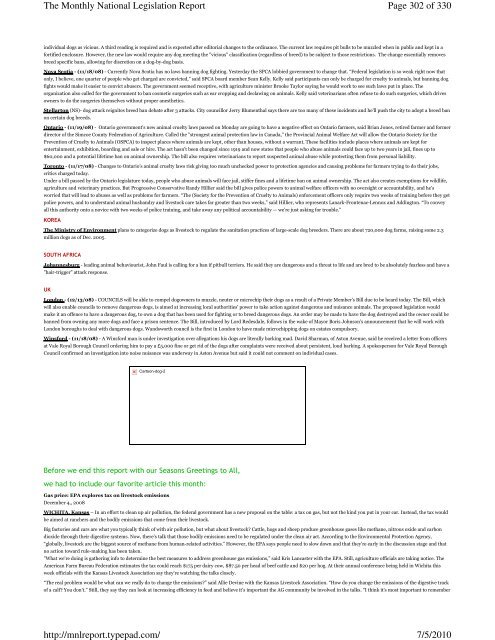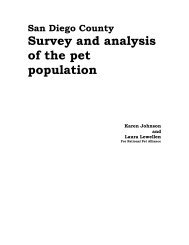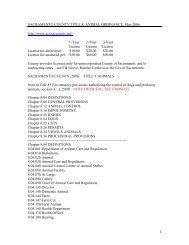Page 1 of 330 The Monthly National Legislation Report 7/5/2010 ...
Page 1 of 330 The Monthly National Legislation Report 7/5/2010 ...
Page 1 of 330 The Monthly National Legislation Report 7/5/2010 ...
You also want an ePaper? Increase the reach of your titles
YUMPU automatically turns print PDFs into web optimized ePapers that Google loves.
<strong>The</strong> <strong>Monthly</strong> <strong>National</strong> <strong>Legislation</strong> <strong>Report</strong>http://mnlreport.typepad.com/<strong>Page</strong> 302 <strong>of</strong> <strong>330</strong>7/5/<strong>2010</strong>individual dogs as vicious. A third reading is required and is expected after editorial changes to the ordinance. <strong>The</strong> current law requires pit bulls to be muzzled when in public and kept in afortified enclosure. However, the new law would require any dog meeting the "vicious" classification (regardless <strong>of</strong> breed) to be subject to those restrictions. <strong>The</strong> change essentially removesbreed specific bans, allowing for discretion on a dog-by-dog basis.Nova Scotia - (11/18/08) - Currently Nova Scotia has no laws banning dog fighting. Yesterday the SPCA lobbied government to change that. “Federal legislation is so weak right now thatonly, I believe, one quarter <strong>of</strong> people who get charged are convicted,” said SPCA board member Sean Kelly. Kelly said participants can only be charged for cruelty to animals, but banning dogfights would make it easier to convict abusers. <strong>The</strong> government seemed receptive, with agriculture minister Brooke Taylor saying he would work to see such laws put in place. <strong>The</strong>organization also called for the government to ban cosmetic surgeries such as ear cropping and declawing on animals. Kelly said veterinarians <strong>of</strong>ten refuse to do such surgeries, which drivesowners to do the surgeries themselves without proper anesthetics.Stellarton (NS)- dog attack reignites breed ban debate after 3 attacks. City councillor Jerry Blumenthal says there are too many <strong>of</strong> these incidents and he'll push the city to adopt a breed banon certain dog breeds.Ontario - (11/19/08) - Ontario government's new animal cruelty laws passed on Monday are going to have a negative effect on Ontario farmers, said Brian Jones, retired farmer and formerdirector <strong>of</strong> the Simcoe County Federation <strong>of</strong> Agriculture. Called the "strongest animal protection law in Canada," the Provincial Animal Welfare Act will allow the Ontario Society for thePrevention <strong>of</strong> Cruelty to Animals (OSPCA) to inspect places where animals are kept, other than houses, without a warrant. <strong>The</strong>se facilities include places where animals are kept forentertainment, exhibition, boarding and sale or hire. <strong>The</strong> act hasn't been changed since 1919 and now states that people who abuse animals could face up to two years in jail, fines up to$60,000 and a potential lifetime ban on animal ownership. <strong>The</strong> bill also requires veterinarians to report suspected animal abuse while protecting them from personal liability.Toronto - (11/17/08) - Changes to Ontario’s animal cruelty laws risk giving too much unchecked power to protection agencies and causing problems for farmers trying to do their jobs,critics charged today.Under a bill passed by the Ontario legislature today, people who abuse animals will face jail, stiffer fines and a lifetime ban on animal ownership. <strong>The</strong> act also creates exemptions for wildlife,agriculture and veterinary practices. But Progressive Conservative Randy Hillier said the bill gives police powers to animal welfare <strong>of</strong>ficers with no oversight or accountability, and he’sworried that will lead to abuses as well as problems for farmers. “<strong>The</strong> (Society for the Prevention <strong>of</strong> Cruelty to Animals) enforcement <strong>of</strong>ficers only require two weeks <strong>of</strong> training before they getpolice powers, and to understand animal husbandry and livestock care takes far greater than two weeks,” said Hillier, who represents Lanark-Frontenac-Lennox and Addington. “To conveyall this authority onto a novice with two weeks <strong>of</strong> police training, and take away any political accountability — we’re just asking for trouble.”KOREA<strong>The</strong> Ministry <strong>of</strong> Environment plans to categorize dogs as livestock to regulate the sanitation practices <strong>of</strong> large-scale dog breeders. <strong>The</strong>re are about 720,000 dog farms, raising some 2.3million dogs as <strong>of</strong> Dec. 2005.SOUTH AFRICAJohannesburg - leading animal behaviourist, John Faul is calling for a ban if pitbull terriers. He said they are dangerous and a threat to life and are bred to be absolutely fearless and have a"hair-trigger" attack response.UKLondon - (12/13/08) - COUNCILS will be able to compel dogowners to muzzle, neuter or microchip their dogs as a result <strong>of</strong> a Private Member's Bill due to be heard today. <strong>The</strong> Bill, whichwill also enable councils to remove dangerous dogs, is aimed at increasing local authorities' power to take action against dangerous and nuisance animals. <strong>The</strong> proposed legislation wouldmake it an <strong>of</strong>fence to have a dangerous dog, to own a dog that has been used for fighting or to breed dangerous dogs. An order may be made to have the dog destroyed and the owner could bebanned from owning any more dogs and face a prison sentence. <strong>The</strong> Bill, introduced by Lord Redesdale, follows in the wake <strong>of</strong> Mayor Boris Johnson's announcement that he will work withLondon boroughs to deal with dangerous dogs. Wandsworth council is the first in London to have made microchipping dogs on estates compulsory.Winsford - (11/18/08) - A Winsford man is under investigation over allegations his dogs are literally barking mad. David Sharman, <strong>of</strong> Aston Avenue, said he received a letter from <strong>of</strong>ficersat Vale Royal Borough Council ordering him to pay a £5,000 fine or get rid <strong>of</strong> the dogs after complaints were received about persistent, loud barking. A spokesperson for Vale Royal BoroughCouncil confirmed an investigation into noise nuisance was underway in Aston Avenue but said it could not comment on individual cases.Cartoon-dog-2Before we end this report with our Seasons Greetings to All,we had to include our favorite article this month:Gas price: EPA explores tax on livestock emissionsDecember 4,, 2008WICHITA, Kansas – In an effort to clean up air pollution, the federal government has a new proposal on the table: a tax on gas, but not the kind you put in your car. Instead, the tax wouldbe aimed at ranchers and the bodily emissions that come from their livestock.Big factories and cars are what you typically think <strong>of</strong> with air pollution, but what about livestock? Cattle, hogs and sheep produce greenhouse gases like methane, nitrous oxide and carbondioxide through their digestive systems. Now, there’s talk that those bodily emissions need to be regulated under the clean air act. According to the Environmental Protection Agency,“globally, livestock are the biggest source <strong>of</strong> methane from human-related activities.” However, the EPA says people need to slow down and that they’re early in the discussion stage and thatno action toward rule-making has been taken."What we're doing is gathering info to determine the best measures to address greenhouse gas emissions,” said Kris Lancaster with the EPA. Still, agriculture <strong>of</strong>ficials are taking notice. <strong>The</strong>American Farm Bureau Federation estimates the tax could reach $175 per dairy cow, $87.50 per head <strong>of</strong> beef cattle and $20 per hog. At their annual conference being held in Wichita thisweek <strong>of</strong>ficials with the Kansas Livestock Association say they’re watching the talks closely.“<strong>The</strong> real problem would be what can we really do to change the emissions?” said Allie Devine with the Kansas Livestock Association. “How do you change the emissions <strong>of</strong> the digestive track<strong>of</strong> a calf? You don't.” Still, they say they can look at increasing efficiency in feed and believe it’s important the AG community be involved in the talks. “I think it's most important to remember




